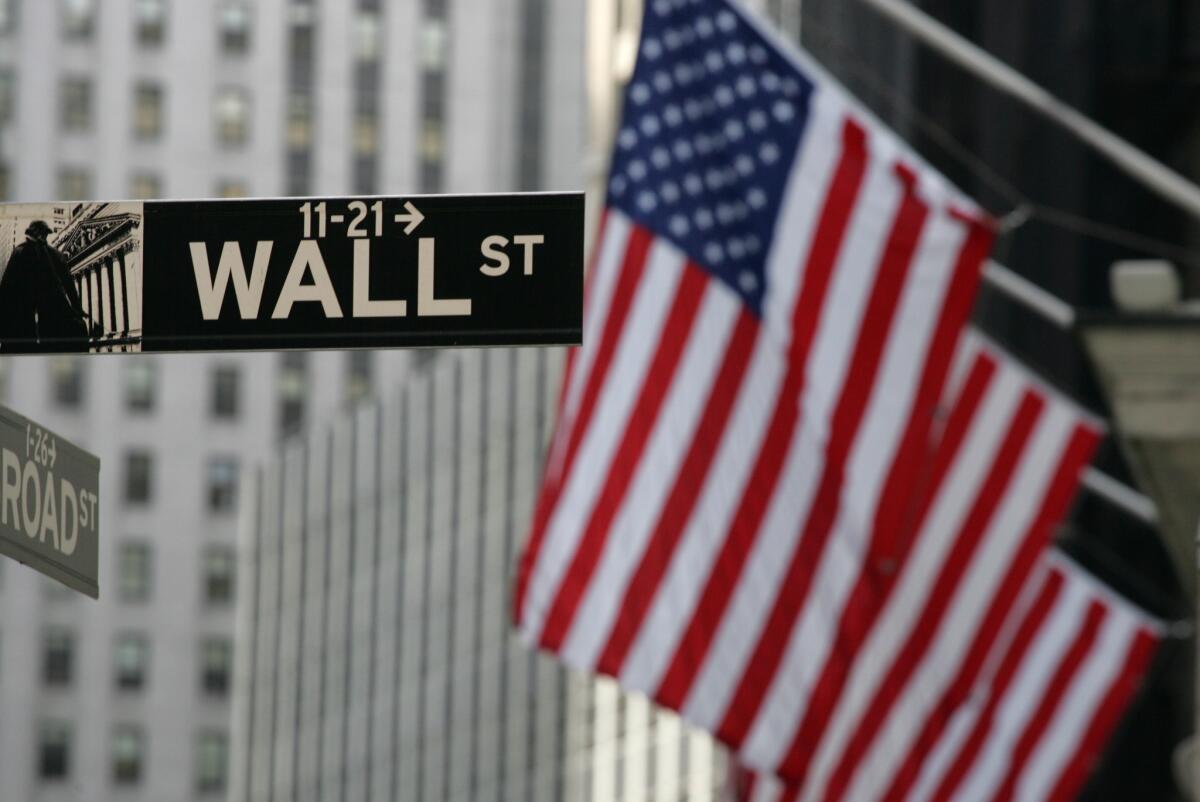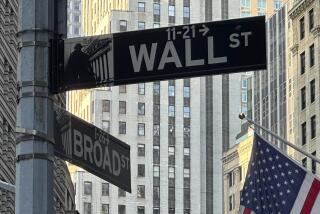Stocks rally despite chaos in D.C.

- Share via
Wall Street rallied Wednesday on expectations of more stimulus for the economy, though the enthusiasm was dampened by chaotic scenes in the nation’s capital.
The Standard & Poor’s 500 index rose 0.6% after having been up 1.5% earlier, while the Dow Jones industrial average closed at a record high. Investors piled into stocks of smaller companies, banks and other businesses that would be winners if Democrats push through more economic aid for hurting Americans and businesses. The yield on the 10-year Treasury topped 1% for the first time since March.
The rally lost some momentum Wednesday afternoon after the U.S. Capitol building went into lockdown as supporters of President Trump broke through barricades and entered the building following clashes with police. Both houses of Congress abruptly went into recess, interrupting debate over the electoral college vote that gave Joe Biden the presidency. Earlier, Trump riled up the crowd with his baseless claims of election fraud.
Stocks got off to a strong start after Democrats won one of the two runoff elections in Georgia. The second race was also called for them later in the day, handing the party of President-elect Biden control of the Senate.
The S&P 500 rose 21.28 points to 3,748.14. The Dow gained 437.80, or 1.4%, to 30,829.40. The index had been up 631 points. The Nasdaq composite, which is full of tech stocks, shed early gains as investors shifted away from the winners of the stay-at-home economy of the pandemic and rotated into companies whose profits would benefit most from a healthier economy. The index fell 78.17 points, or 0.6%, to 12,740.79.
A report Wednesday underscored how fragile the economy is because of the worsening pandemic. Payroll processor ADP said private employers cut 123,000 more jobs last month than they added. It was much worse than economists’ expectations for job growth, and it was the weakest such report since April. The Labor Department’s more comprehensive report on jobs growth is due out Friday.
The Russell 2000 index of small-cap stocks nevertheless surged 78.81 points, or 4%, to 2,057.92, a record high. Another round of stimulus for the economy could benefit smaller companies in particular because they tend to have smaller financial cushions to survive long-term downturns.
Stocks of companies that would profit from increased spending on infrastructure also helped lead the market. United Rentals, whose catalog includes forklifts and light towers for construction sites, jumped 8.9% for one of the bigger gains in the S&P 500. Vulcan Materials, which sells asphalt and other construction materials, rose 8.2%.
Big spending plans for the economy could trigger not only stronger growth for the economy in the future but also heavier borrowing by the U.S. government and maybe even inflation. Those factors helped push up Treasury yields, and the yield on the 10-year Treasury rose to 1.04% from 0.94% late Tuesday.
The increase in yields, along with rising hopes for a strengthening economy, helped push banks higher. Financial stocks rose 4.4% for the biggest gain among the 11 sectors that make up the S&P 500. Zions Bancorporation jumped 11.2%, and KeyCorp gained 9.7%.
On the other end of the market was Big Tech. A Democratic controlled Washington could mean tougher regulations are on the way for the group, which already has been facing increased scrutiny. Several Big Tech stocks fell, including a 3.4% drop for Apple and a 2.8% decline for Facebook. These are among the biggest companies on Wall Street, which gives their stock movements outsized weight on the S&P 500 and other indexes.
The rise in Treasury yields also undercuts one of the underpinnings for some tech stocks and other high fliers that breezed through the pandemic.
When bonds are paying more in interest, it can pull some investors away from stocks. And that can hit companies in particular that trade at relatively expensive prices compared with their earnings. That could accelerate the rotation that investors have begun out of tech stocks and into beaten-down, cheaper areas of the stock market.
The rise in yields also adds pressure on the Federal Reserve, which has kept short-term interest rates at record lows in hopes of stimulating the economy.
Democratic control of Washington could also lead to higher tax rates for businesses, which would crimp profits and add downward pressure on stocks broadly.
Analysts, though, also caution that no big changes may ultimately come from Washington given how slim the Democratic majority may be. The party will have a 50-50 split in the Senate, with Democratic Vice President-elect Kamala Harris providing a tie-breaking vote.
European markets ended broadly higher and Asian markets ended mixed.
More to Read
Inside the business of entertainment
The Wide Shot brings you news, analysis and insights on everything from streaming wars to production — and what it all means for the future.
You may occasionally receive promotional content from the Los Angeles Times.










